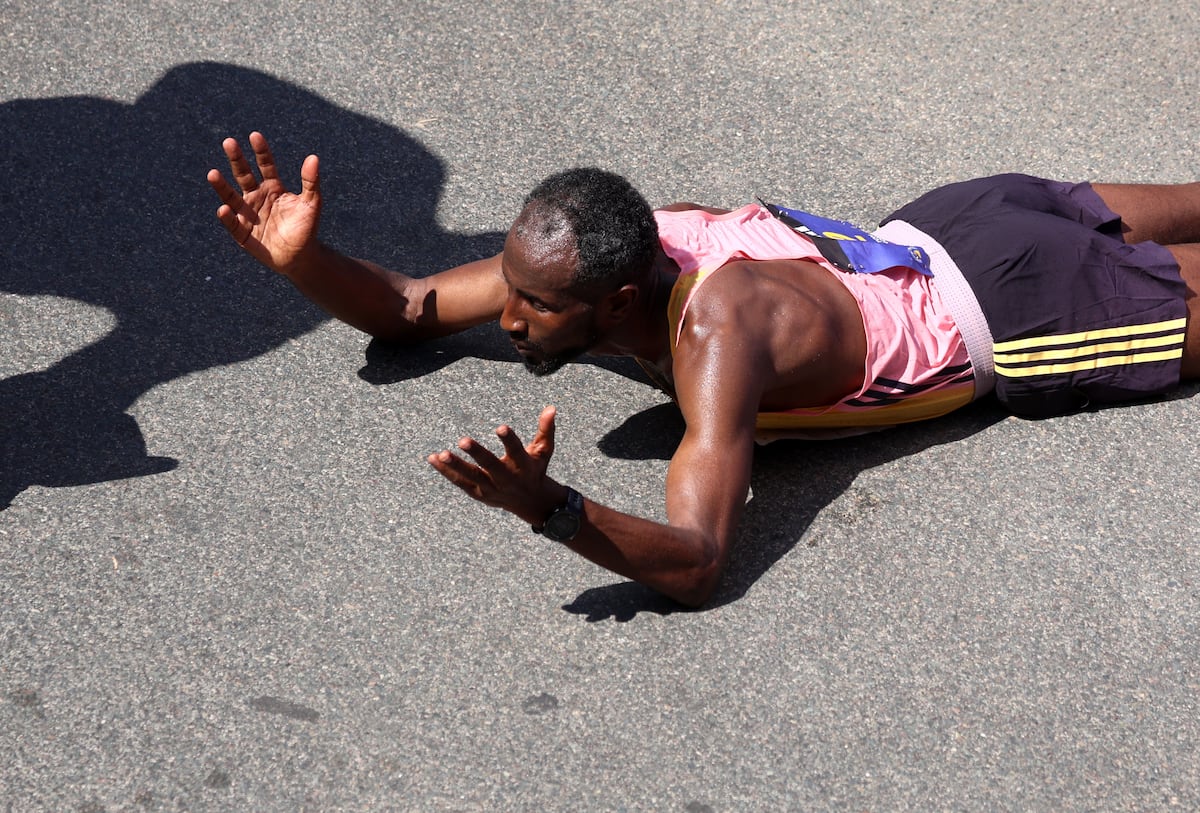The Ethiopian Sisay Lemma (2h 6m 18s) and the Kenyan Hellen Obiri (2h 22m 37s) won the Boston Marathon, the oldest in the world that traditionally opens the
major
season in the West on the third Monday of April, the holiday of Patriot Day in the capital of New England. It was the fourth attempt for the Ethiopian, winner in Valencia five months ago, who splendidly maintained a record pace until Heartbreak Hill, where all wills break. Obiri, winner in Boston and New York last year, completes a magnificent triple.
On April 14, bright Sunday, in Rotterdam, man should have reached the marathon moon. It was announced at the end of last year that in the port city of the Netherlands, Kelvin Kiptum, the man of 2h 35s, would become the first athlete to go under two hours in the 42.195 kilometers, but the desolate reality in the form of traffic accident killed the young Kenyan boy, 24 years old, on February 11.
On Monday the 15th, Patriot's Day in Boston, the birthplace of the marathon, since 1897, nothing is celebrated. Melancholy is queen, the depression that follows the explosion, so fleeting, of 2023, the year in which everything changed before returning to the way it was before. At dawn on April 17 one year ago, Kipchoge was God, untouchable world record holder (2h 1m 9s), invincible double Olympic champion. Two hours or so later he was a soaked athlete who limped and suffered, and finished as best he could because the word retire does not exist in his vocabulary (he was sixth, 2h 9m 23s). Kiptum was then a blurry threat, an unknown youngster who had run in December in Valencia in 2h 1m 53s. The Kiptum haze began to be outlined more clearly six days later, on April 23, in London (2h 1m 25s, so close to the Kipchoge sun) and became overwhelming on October 8 in Chicago (2h 35s), two weeks after that in Berlin Kipchoge stayed in 2h 2m 42s.
The revolution had triumphed. In his last marathon, in Tokyo a month ago, Kipchoge was tenth (2h 6m 50s). His aspiration to become the first marathoner with three Olympic titles is beginning to fade.
In Hopkinton, where the Boston Marathon starts this Monday, April 15 at 9:37, Kelvin Kiptum is mourned, the man to whom the two hours had been promised, and who died so young, and observing the shadows on the ground in the Warm morning, it is regretted that King Eliud Kipchoge had chosen for his immolation the 2023 edition, cold, rain, slopes and valleys deadly for his joints and his morale, instead of 2024, where everything would favor him, even the wind of backs. The marathon throne is empty and, wisely, Boston recovers its old essence. The route is the protagonist, and the old stories of women's struggle, sad memories of bombs, a citizen event with thousands of participants, and without hares.
Since the route is linear, and descending and broken—the 42.195 kilometers from Hopkinton, at 143.3 meters above sea level, to Boylston Street, in front of the Boston Public Library, at 1.25 meters above sea level, and a uphill road through valleys and the hills of Newton, Kenmore Square, turn right through Heresford and left at Boylston: 23 kilometers downhill, 16 and a half up and two and a half flat: 438 meters of negative gradient, downhill, and 296 of positive slope, according to calculations by geographer Sean Hartnett—and is enlivened by a strong warm and humid wind that makes it fly, the marks achieved do not count towards records: the clock is not as important as the victory. Not for the
Lemma
show .
For Lemma, both matters count, as he already demonstrated in the Valencia marathon last December, a race in which, with 2h 1m 48s, the fourth best mark in history, he broke the race record set by Kiptum a year before. The 33-year-old Ethiopian, winner in London in 2021, ran alone, in the lead, practically the 42.195 kilometers, downhill and uphill, and against the clock. In passing through the half marathon (1h 19s) he beat the test record by a minute and a half and maintained the trend, and the possibility of breaking the record of the Boston marathon (2h 3m 2s on a gale day in his favor) with up to three minutes ahead of the pursuers, until the 33 kilometer wall, the Heartbreak hill precisely, where he began to faint. He ended up almost crawling, far from all records: 1h 5m 59s the second half, almost six minutes slower than the first. Second was his compatriot Mohamed Esa (2h 6m 58s) and third was the great favorite, the Kenyan Evans Chebet, winner the previous two years who, with Achilles tendon problems, finished in 2h 7m 22s.
With a spirit more practical than adventurous, more tactical than crazy, and following the advice of her coach at the On Athletics Club Dathan Ritzenhein, Obiri, the sixth athlete to win two years in a row in Boston, remained calm in a large group of shared responsibilities until Heartbreak Hill, where with small changes of pace he eliminated rivals. Arriving at kilometer 41, she drained the last drops of her stimulating drink, caffeine along with the usual carbohydrates, and sprinted long to defeat the last person who could keep up with her, her compatriot Sharon Lokedi, who finished second (2h 22m 45s). The third was another Kenyan, the gold veteran Edna Kiplagat (2h 23m 21s), 44 years old and double world champion more than a decade ago.

